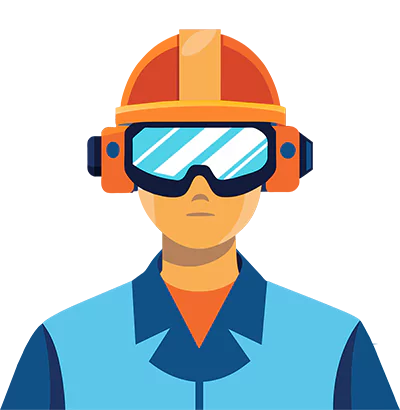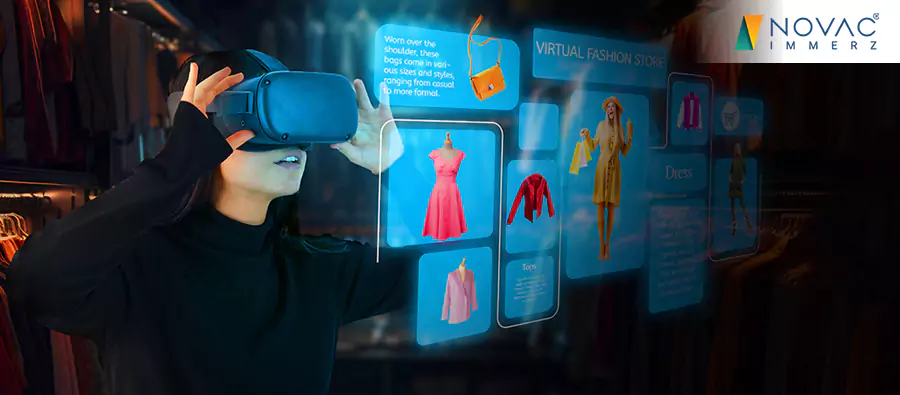Overview
The Quality Control process happens at the final stage of production where manufacturers incur significant costs in the case of defective products. Immersive Technologies like AR VR impacts the quality control in manufacturing as they recognize production defects beforehand.
Manufacturing defects can occur due to low-quality materials, negligence, and usage of improper methodologies. Immersive Tech analyzes data in real time and recognizes inconsistencies in the production stages early on. Workers get visual feedback about product specs and quality requirements. They can instantly rectify faults and decrease the rejection rate of finished products.

Role of AR and VR in Quality Control

Novac Immerz, a leading Augmented Reality Development Company, offers custom Augmented Reality Solutions to ease the quality assurance process for manufacturers. By comparing the physical components on the manufacturing floor, AR can accurately create digital models, enabling workers to find flaws in the parts by following the digital instructions superimposed on the assembly line.
Integrating our AR solutions directly into the production environment will enable manufacturers to maintain high-quality standards, greater visibility, and reduced chance of errors.
Workers can wear AR glasses and experience a 360-degree visualization of products. Apart from comparing actual parameters with predefined standards, they can locate defective parts and check the key features of highlighted parts.
Digital work instructions facilitate quick inspections without affecting the production cycle. Augmented Reality also has information visualization capabilities. It generates reports about the number of defective items, kinds of glitches, and average inspection time at specific data points. This guarantees consistency when quality inspectors undertake the design review.
Novac Immerz’s Virtual Reality Solutions also share real-time alerts (audio prompts, clear illustrations, and visual warnings) for errors or mistakes.
As a reputed Virtual Reality Development Company, our immersive solutions train workers on quality control procedures and allow them to undergo training in a controlled environment.
Through simulation of incident scenarios, machinery mechanisms, and situations through 3D highlight points, audio, photos, and videos will help workers know every step of the manufacturing process. They can upgrade their orientation skills by practicing in high-risk areas. In the long run, this decreases the chance of accidents, errors, and injuries in the workplace.
Our Augmented Reality Solutions can gather data by comparing physical objects with digital models across all stages of the quality control process. The production process is optimized as technicians will get real-time information about components and tools.
Manufacturers can enhance operational efficiency by getting information about object location, equipment conditions, faulty parts, and inventory availability. Comprehensive insights (graphics and video feed) are offered to maintain equipment health. Quality inspectors can optimize the production process after finding trends based on data analysis.
The Advantages of AR and VR for Quality Control in Manufacturing
AR technology offers instantaneous feedback to quality inspectors when there is a slight shift from predefined standards. It is a stark contrast to manual verification, which takes several hours. Computer vision technology will capture digital images of objects on the manufacturing floor. This ensures timely identification of defects in the production process.
Novac Immerz’s Augmented Reality Solutions ensures experts can seamlessly share knowledge with new workers. They need not travel to manufacturing facilities to solve issues. AR saves time, reduces recurring maintenance costs, and ensures timely resolution of queries.
- Optimization of product development
AR-based systems enable workers to share final product designs instantly. They will receive easy-to-follow instructions and step-by-step guidance. Thus, employees can adapt efficiently on the factory floor despite working at different stages of the production line.
Building a machine involves conceptualization, prototyping, error detection, and redesigning. Our Virtual Reality Solutions enable collaborative design reviews in a controlled environment,speeds up the validation process, prevents delays in manufacturing and facilitates faster go-to-market
Virtual models can be changed at the conception stage itself. It ensures quicker design iterations with a focus on customer-centric production
- Compliance with safety standards
Virtual Reality can monitor hazardous conditions in factories. Simulations of dangerous situations enable workers to learn the correct procedures while handling sensitive equipment. They can view the virtual replica of the equipment, machinery, and workstations. It will enhance their responsiveness to emergencies.
Concluding Points
As manufacturers look to create futuristic factories, immersive technologies will ensure that products get designed with near-zero error rates. In the future, AR and VR for manufacturing industry will impact Design, Workforce Training, Assembly, Disassembly, Maintenance, and Repairs.
Are you a manufacturer looking to implement quality control processes with pinpoint precision? Connect with Novac Immerz and take the utmost advantage of our simulations.

Pradeep B

Pradeep heads Novac Learning, the digital learning vertical of Novac Technology Solutions Pvt. Ltd., where he drives innovation in training methodologies. Under his guidance, Novac Learning supports organisations in seamlessly transitioning from traditional to digital training formats by implementing cutting-edge Learning Management Systems. Pradeep also leads the immersive technology solutions division at Novac Immerz, where his team crafts immersive experiences for training and marketing purposes.






